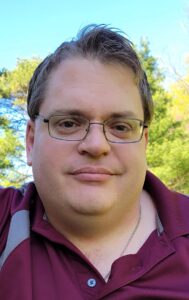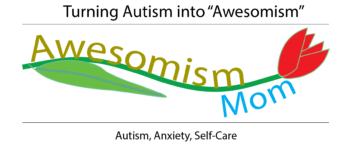 Jim’s journey of being an autistic adult is an in depth look at his life. We are honored to have him share his experiences with us. We at Team Awesomism are committed to giving autistic adults a voice. We hope you learn from this guest blog! Want to learn more about Team Awesomism? here are a couple of links:
Jim’s journey of being an autistic adult is an in depth look at his life. We are honored to have him share his experiences with us. We at Team Awesomism are committed to giving autistic adults a voice. We hope you learn from this guest blog! Want to learn more about Team Awesomism? here are a couple of links:
I am a two-time Pennsylvania State University graduate with over 15 years of
dedicated community service volunteering. I began as a grassroots advocate in October
2016 and have since highlighted challenging mental health issues as both a published
writer and a self-made presenter. Now, my goals are to advance autism research, re-
evaluate resource needs for all demographics, improve the quality of existing services,
and develop new resources so that the overall quality of autistic life is better than it has
been. It matters how people are treated.
I am currently a Program Leader for NAMI’s “In Our Own Voice” presentation
program. I also have QPR Gatekeeper layperson suicide prevention training.
I will not rest in my efforts to achieve reasonable accommodations for autistic
employment, improved health care, and a boost to our overall quality of life. This is why
I put my strengths and skills on the line every day. Millions of legitimately autistic
people all across the world depend on it.
Jim R. Irion
Mental Health Advocate
AwesomismMom BLOG
March 2024
Hello. My name is Jim Irion. I was born and raised in Pennsylvania, USA. My life first
began as a preemie 42 years ago. But it seems so long ago now. In the last seven years, I have
been on a scathing journey of self-discovery. One wrought with life-altering trauma, crippling
social perils, and grave importance for far more people than just me. Everything I came to know
or trust has not been the same since. In 2019, at age 37, I was late-diagnosed as autistic. The
chain of events that led to this started three years earlier. My employment had been terminated
for what I later learned was unfiltered behavior. Once-quelled suicide ideations returned in full
force and threatened to overwhelm me. If I had hope of survival, my path through life needed to
change dramatically. So I stopped applying for work and sought to address my mental health.
I had no one to turn to. It was suggested that I explore the local mental health volunteer
community to look for guidance. Without knowing how easily cross-neurotype communication
problems can occur for autistic people, I was forced into situations where I naively trusted people
I did not know. I was oblivious to my autistic behavior, and it resulted in alienating community
leaders who ostracized or tried to exclude me from volunteer work. Two months before I started
my first true counseling sessions, this caused a suicide relapse in August 2018. So I describe it
as my summer from hell. The following spring, thanks to the failure of dialectical behavioral
therapy, my counselor had a hunch that I might be autistic. In August 2019, it was confirmed
with a diagnosis. Unfortunately, my healthcare providers both neglected to accommodate it.
In May 2022, I was directed to the NIMH overview, which said autism was neurological.
This helped me realize that autism deeply influenced my life. Having actual awareness afforded
me the confidence to pursue presentation opportunities about autism resource needs. But I was
missing something important. Then, in April 2023, the case of a younger, late-diagnosed autistic
woman whose PTSD led me to a breakthrough. She experienced severe distress when there was
no pathway of employment for her monotropic interest as a harpist. The exact same problem had
interfered with my economic integration for years. Finding her case triggered the discovery that
I was in denial of my late autism diagnosis. When I coped with it, I found permanent damage to
my socioeconomic development. Years of neglect by healthcare providers were responsible.
Having this serious awareness came at a price. The trauma shredded my mental health
and forced a survival instinct to kick in. Fortunately, I found formal research that proved these
were legitimate concerns for the autistic quality of life. Seeing no alternative, I advocated to my
healthcare provider about the Double Empathy Problem Theory and tried to secure employment.
But my implied need for accommodations was rebuffed. So, on October 24 th , 2023, I formally
requested four that had never been requested before. This was in an effort to solve the problems
in my life that the research now indicated were actually true. However, on February 13 th , 2024, I
was forcibly discharged from my care provider in a potentially discriminatory move. Now, the
need to solve the problem of monotropism and employment has cost me my mental health care.
Forty-two years is a long time to discover that neglect by highly educated professionals
and corporate healthcare providers has ruined your life. It is equally disturbing how much trust I
have placed in these so-called administrators and experts. Knowing is half the battle. The other
half is doing something about it. But not everyone has the awareness, security, or confidence to
address their actual autistic or ADHD support needs. I did, and it cost me dearly at a time when
I needed quality health care more than ever. Now, I begin the very first year of my life knowing
that autism is both an integral part of my existence and a target on my back. Thanks to research
by competent experts like Dr. Damian Milton, Dinah Murray, and Kieran Rose, I can actually
advocate for legitimate support needs because I have learned through bitter firsthand experience.

